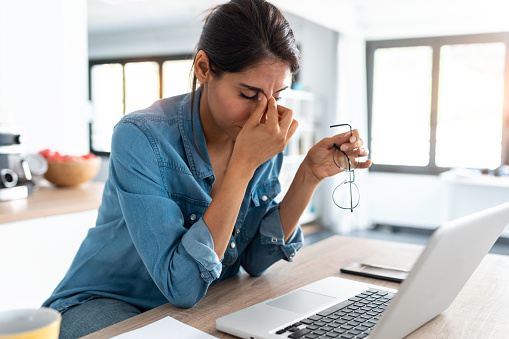Have you figured out your hidden food intolerances and lowered your sugar impact, but you’re still not able to lose weight?
It could be your stress levels.
Studies show that compared with folks who have low stress, those with higher levels of stress have high body mass index (BMI) levels. (1) A high BMI is a marker for obesity and metabolic diseases including diabetes.
Like blood pressure or blood sugar, I want you to see weight as just another metric. (The scales are not there to torment you, I promise.)
Your weight can show that you may have inadvertently damaged your metabolism.
As a result, you have to get healthy so your body naturally loses weight.
Many people get that wrong. They try to lose weight to get healthy.
Lots of factors can wreak havoc on your metabolism and slow down your weight, even with your best efforts to diet and exercise.
And a huge one, especially over the past two years, has been stress.
Stress Crashes Weight Loss and Steals Your Overall Health
Stress comes in many ways.
It could include financial pressure, caring for a family member or dealing with your own health issues, homeschooling your kids, or just plain uncertainty with everything going on in the world right now.
You could be doing everything else right, but if you’re not handling stress, it will take you down.
You probably already know stress can make you gain weight, but that’s the tip of the iceberg.
Among its havoc, chronic stress:
- Makes you age faster
- Crashes your sex drive
- Lowers your immune system
- Breaks down muscle
- Raises your blood sugar
- Sinks your metabolism
- Increases inflammation and insulin resistance
- Makes your gut leaky (which leads to food intolerance and wreaks havoc on your hormones)
Yikes, right?
To be strong and resilient, we need a little bit of stress. Think about an intense workout. Going to the gym and working out is putting stress on your body so it gets stronger.
What we don’t thrive on is chronic stress, which puts us into survival mode.
With chronic stress, your body thinks either you’re being chased by a wild animal or you’re going to starve. As a result, it cranks up your stress hormones.
Cortisol is the main stress hormone. When chronic stress knocks cortisol out of whack, you’ll feel it.
Your sleep suffers, you are irritable and impatient, you’re hungry (and not for salmon). Nope, you want carbs and more carbs.
The end result is a vicious cycle, with weight loss resistance as an inevitable repercussion.
You can’t eliminate stress, but you can change your perception of it and how it impacts you.
And you can learn to better manage stress with these 10 strategies.
De-Stress Strategy 1: Eat by the Plate
Among its havoc, chronic stress messes with your blood sugar, sending you on a rollercoaster that spikes and crashes a few hours later.
And when you’re eating high Sugar Impact foods, you’re going to feel that crash hard.
When you eat my favorite trifecta – protein, fat, and fiber from plant foods – you keep steady blood sugar levels. You feel better, have more energy, and you’re able to lose weight.
Getting that magic trifecta is easy when you break your fast every morning with a loaded smoothie. Then, you’ll eat by the Plate every 4 – 6 hours.
The end result is steady, sustained blood sugar levels so you rock your day like a champ.
Need some yummy ideas? I’ve got over 50 recipes in this guide. It’s FREE… and guaranteed to be a game changer for fat loss and overall health. Claim yours here.
De-Stress Strategy 2: Drink Green Tea
Green tea is an all-around rock star beverage.
Among its benefits, drinking it regularly can lower your risk of heart disease, obesity, and type 2 diabetes.
Plus, research shows that green tea can help your body manage stress levels.
A polyphenol called epigallocatechin gallate (EGCG) is the leader here, but green tea has lots of other nutrients.
One of them is a calming amino acid called L-theanine, which makes green tea great to manage stress as well as naturally reducing blood pressure and anxiety. (2)
I drink 32 ounces of green tea throughout the day. You can enjoy it iced or hot.
And if you’re caffeine sensitive, you can opt for decaf green tea.
De-Stress Strategy 3: Get Consistent Exercise
You’ve likely felt the euphoric afterglow of an intense exercise.
You feel on top of the world, full of energy…. And your stress levels just melt.
Any kind of movement can help you dissolve stress. High-intensity interval training or HIIT is one of my favorites.
HIIT can help train your nervous system and give you the confidence to tackle whatever the day throws at you. Best of all, you can get a workout in just minutes.
Learn more about HIIT here.
Yoga is also great to balance your nervous system and dial down stress. And an after-meal walk will do wonders for your stress levels.
De-Stress Strategy 4: Eat Chocolate
When you’re stressed out, you want chocolate, right?
One reason is because your feel-good neurotransmitter serotonin is low.
When your serotonin is low, you get anxious and irritable. You can’t sleep, which adds to stress.
The flavanols in dark chocolate boost brain function and lower stress hormones, so they help you stay more focused and calm.
Dark chocolate also contains magnesium, which I call the aaaah mineral because it can help you relax.
The key is to choose the right kind of dark chocolate. Look for a high-cacao, low- or no-sugar kind.
De-Stress Strategy 5: Use Lavender
Lavender carries a long history of therapeutic uses, including supporting relaxation as well as reducing blood pressure and heart rate.
Lavender is a natural antidepressant that also stabilizes your mood, relieves pain, and can even prevent seizures and migraines.
You can use lavender a few different ways. Inhale lavender essential oil by adding a few drops onto a cloth and breathing in the aroma. Or you can add a few drops into a diffuser.
When my son Grant was in the hospital for months with a severe traumatic brain injury, I diffused lavender in his room. It was one of the first things he responded to.
De-Stress Strategy 6: Meditate
Last year, I found Dr. Joe Dispenza. I have been using his guided meditations ever since. They have been a game changer for me.
Studies prove that meditation works, too.
One review of 45 studies found that meditation lowered blood pressure and heart rate, reduced cortisol levels, and decreased other markers of stress. (3)
Find a type of meditation that works for you. That might include deep breathing, mindfulness, or a more structured practice like Transcendental Meditation.
My pal Emily Fletcher talks about how meditation can melt stress in this podcast.
De-Stress Strategy 7: Add the Right Nutrients
A few well-researched nutrients can support your efforts to manage stress.
One of my favorites is magnesium. Dark chocolate and other foods contain a little magnesium.
But you’ll want to get therapeutic amounts for great sleep, stress management, headaches, and even keep things moving “down there.”
Whether I’m in a stressful business meeting, have a tension headache, or my mind is racing before bed, taking 300 mg of Magnesium Body Calm calms me down significantly.*
Other stress-relieving nutrients include:
Vitamin C
Your adrenals, which secrete stress hormones, house more vitamin C than any other organ.
Stress can deplete vitamin C quickly, which makes supplementing so important.
B Vitamins
Stress depletes B vitamins like crazy. Look for a B-complex supplement that provides a combination of essential B vitamins to support optimal mental health, brain activity, and feelings of well-being.*
Omega-3 Fatty Acids
Among their benefits, these anti-inflammatory fatty acids support brain health… including your brain’s ability to manage anxiety and stress. *
Omega Plus contains a highly potent, non-GMO fish oil, derived from fish oils in their natural triglyceride (TG) form (the same way they naturally occur in fish).
Every softgel provides an impressive 662 mg of EPA and 250 mg of DHA in just one softgel! Most supplements demand multiple softgels to get anywhere near that amount.
De-Stress Strategy 8: LOL Regularly
Laughter really is the best medicine.. It releases endorphins and just makes you feel good.
In our current climate, we could all stress less by laughing more.
Find what makes you LOL and do it more often.
That might mean streaming comedies on Netflix, seeing standup comedy, or watching short clips.
Need somewhere to start? Check out my buddy Dr. Tony Youn’s YouTube videos.
De-Stress Strategy 9: Get Great Sleep
You’re likely aware of the aftermath of crappy sleep. Things that normally would be little road bumps become massive stressors.
Conversely, when you consistently get 7 – 9 hours of solid, uninterrupted sleep every night, you’re able to manage stress like a champ.
You’re also more likely to bypass cravings and keep hunger at bay, so you lose weight better.
Trust me, I know what a challenge that falling and staying asleep can be.
Sleep Candy™ is my go-to formula that combines melatonin with other calming nutrients like inositol and 5-HTP. The end result? Deep, restorative sleep… every single night. *
De-Stress Strategy 10: Work on your Mindset
Remember what I said earlier: A lot of stress is your perception of stress. Meditation can help you shift your perception. So can gratitude.
Numerous studies associate gratitude with a sense of overall well being, including managing stress levels. (4)
One of the best ways of doing that is by keeping a gratitude journal. Every morning, write down at least three things you’re grateful for.
This was the number one thing I did when my son Grant was in the hospital, and it made a world of difference.
You too will be amazed at the difference gratitude will make throughout the day.
One final note. Please, don’t try all 10 of these at once. That will create more stress! Start with one or two strategies, and then build on that.
Mornings are stressful enough! Make breaking your fast simple with a loaded smoothie. My FREE Smoothie Guide has over 50 delicious and easy-to-make recipes to make mornings – or any time you need a fast, nutritious meal – simple.
References
- Harding JL, Backholer K, Williams ED, Peeters A, Cameron AJ, Hare MJ, Shaw JE, Magliano DJ. Psychosocial stress is positively associated with body mass index gain over 5 years: evidence from the longitudinal AusDiab study. Obesity (Silver Spring). 2014 Jan;22(1):277-86. doi: 10.1002/oby.20423. Epub 2013 Jun 13. PMID: 23512679.
- Unno K, Yamada H, Iguchi K, Ishida H, Iwao Y, Morita A, Nakamura Y. Anti-stress Effect of Green Tea with Lowered Caffeine on Humans: A Pilot Study. Biol Pharm Bull. 2017;40(6):902-909. doi: 10.1248/bpb.b17-00141. PMID: 28566632.
- Pascoe MC, Thompson DR, Jenkins ZM, Ski CF. Mindfulness mediates the physiological markers of stress: Systematic review and meta-analysis. J Psychiatr Res. 2017 Dec;95:156-178. doi: 10.1016/j.jpsychires.2017.08.004. Epub 2017 Aug 23. PMID: 28863392.
- Sansone RA, Sansone LA. Gratitude and well being: the benefits of appreciation. Psychiatry (Edgmont). 2010 Nov;7(11):18-22. PMID: 21191529; PMCID: PMC3010965.
The views in this blog by JJ Virgin should never be used as a substitute for professional medical advice. Please work with a healthcare practitioner concerning any medical problem or concern. The information here is not intended to diagnose, treat, or prevent any disease or condition. Statements contained here have not been evaluated by the Food and Drug Administration.
*These statements have not been evaluated by the Food and Drug Administration. This product is not intended to diagnose, treat, cure, or prevent any disease.






